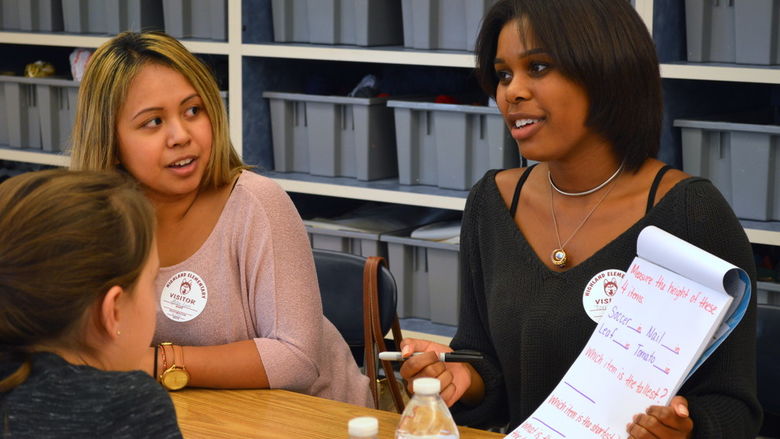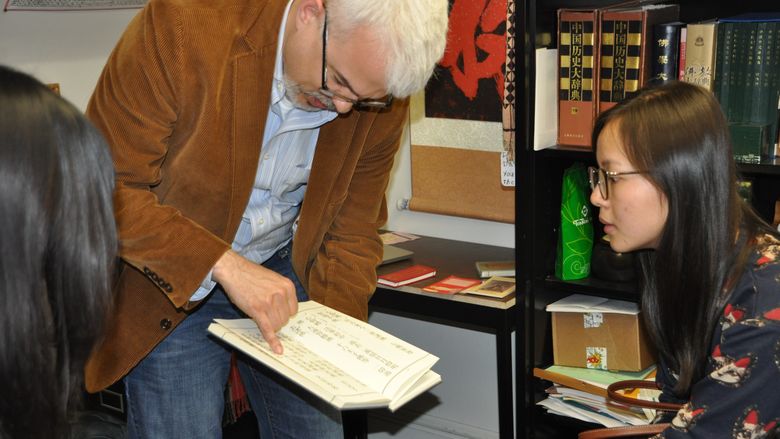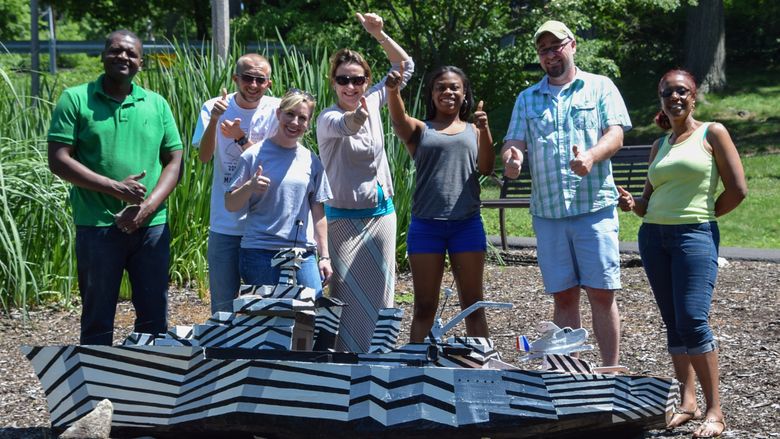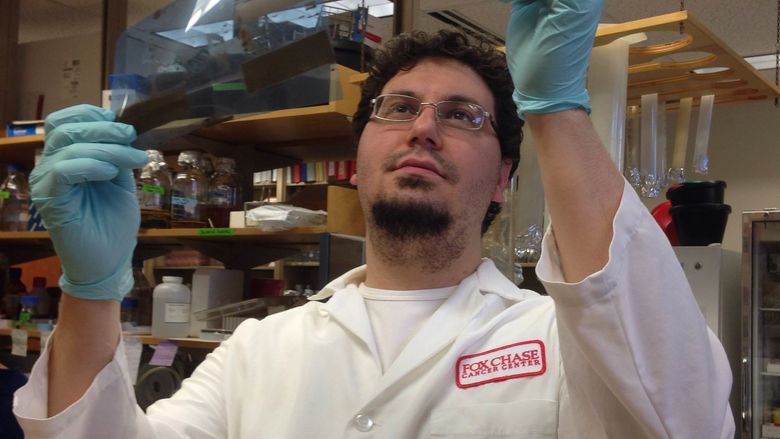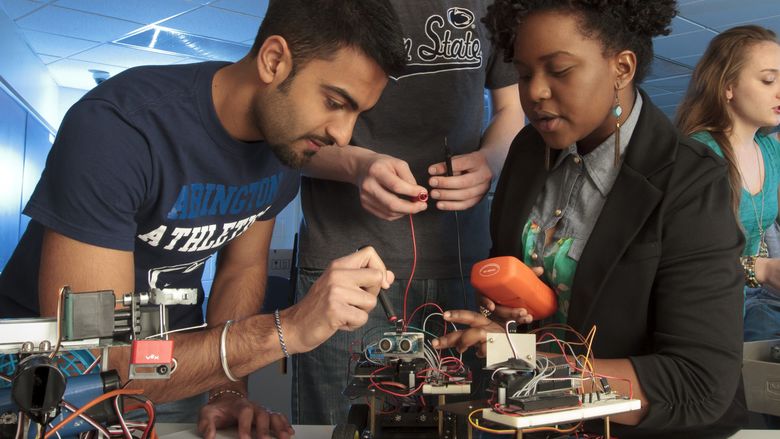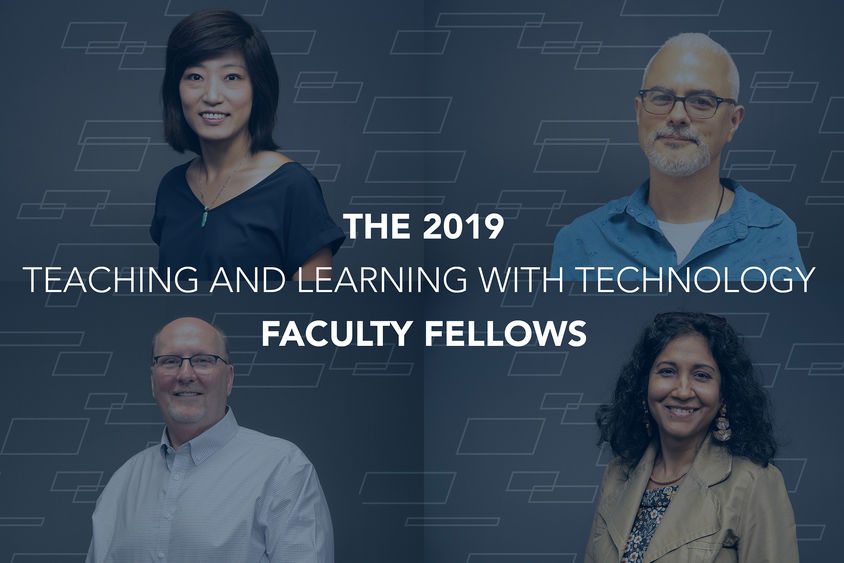
This year’s TLT Faculty Fellows, clockwise from top left: Siu Ling "Pansy" Leung, Pierce Salguero, Priya Sharma and Ed Glantz.
UNIVERSITY PARK, Pa. — Four new faculty fellows have joined Penn State Teaching and Learning with Technology (TLT) for the 2019-20 academic year: Ed Glantz, Siu Ling "Pansy" Leung, Pierce Salguero and Priya Sharma. Each member of the cohort will undertake a project intended to enhance unique spaces where students learn.
“This year’s group of faculty fellows brings a diverse set of perspectives to our theme of learning spaces,” said Kyle Bowen, director of innovation with TLT. “Learning spaces can be physical, digital, virtual, blended or data-informed places where students interact with course material. Each of our fellows is taking an innovative approach to improve learning spaces, and our staff is eager to support their work.”
For the next year, each fellow will work with a dedicated team of TLT staff to realize the goals set forth by their projects. They cover an array of topics that are strongly influenced by each fellow’s discipline and background.
Ed Glantz – "Personalizing Learning Spaces by Streaming and Recording Lectures"
Glantz, a teaching professor and assistant director of masters programs in the College of Information Sciences and Technology, will use his project to explore best practices in recording lectures in the classroom and how it can be used for reflective teaching.
“Two years ago, TLT’s BlendLT seminar and the idea of a flipped class planted the seed for this project,” said Glantz. “Recent technological innovations in video management and cloud storage give us the opportunity to expand learning beyond the physical spaces and provide course content in alternative formats.”
Glantz and his team will explore the technical requirements and the pedagogical value of recording lectures in the classroom. He said this will be paired with new data science capabilities that analyze the topical content in a recorded lecture that will be displayed in a dashboard for the purposes of reflective teaching.
Siu Ling "Pansy" Leung – "Using Mixed Reality to Prepare Students for Better Laboratory Learning Experiences"
Leung is an assistant teaching professor and director of undergraduate laboratories in the Department of Mechanical Engineering. She will investigate how virtual labs can deliver higher quality learning experiences than traditional science and engineering laboratories.
“Performing experiments from fundamental concepts to complex systems requires tremendous time and space,” said Leung. “For instance, learning how an airplane flies without understanding thrust and drag is impossible. A solution could be to transform fundamental topics experiments into virtual labs so students can visualize and revise concepts at their own pace before performing tests on complex scenarios.”
Along with the intent to create multiple virtual lab experiments for students to conduct, the team will study the impact of technology-enhanced learning, and roadmap a platform designed to help other educators create immersive learning experiences.
Pierce Salguero – "Expanding the Asian Studies Classroom Through Virtual Learning Spaces"
Salguero, associate professor of Asian history and religious studies at Penn State Abington, will work with his group to build on an ongoing pedagogical project that is used in the classroom to deliver ethnographic data, photography and short documentary films to students. Immersive technology will be the backbone of the project’s expansion so that students can experience Japanese Buddhist temples without the expense of travel.
“The project’s website provides all content freely through a Creative Commons license,” noted Salguero. “These valuable teaching materials will be available to faculty at other Penn State campuses — and elsewhere throughout the world — as open educational resources. The use of open, public and free technologies makes the work and content both accessible and sustainable so that, long term, students can have deeper learning experiences.”
The scope of Salguero’s project aims to include interactive maps and virtual tours of Buddhist temples native to Japan and virtual tours of Buddhist temples in Philadelphia. Supplemental to the immersive content will be pedagogical supports that aide faculty in the incorporation of the multimedia materials.
Priya Sharma – "Reconceptualizing Places of Learning"
Sharma is an associate professor in the College of Education and hopes to use her project to shift the focus from “spaces” to “places” within the context of learning and design. She posits that learning spaces are arrangements of objects, tools, learners and instructors within a geometrical area while a learning place centers around a lived, personalized experience.
“Penn State is uniquely positioned to engage with the idea of how to create places of learning,” said Sharma. “There is a focus on reinventing and revamping learning spaces across the University’s physical campuses along with World Campus’ continued focus on expanding access to high quality online learning opportunities.”
Beyond knowing that space design requires consideration of seats, scheduling, writable surfaces, etc., Sharma and her team will work to discover how place design considerations, like “How do users create a common and shared experience through their work within a space,” can work in concert with space design. That, she said, would provide the foundation of a framework to guide practical and theoretical learning design and architecture efforts around spaces and places.
